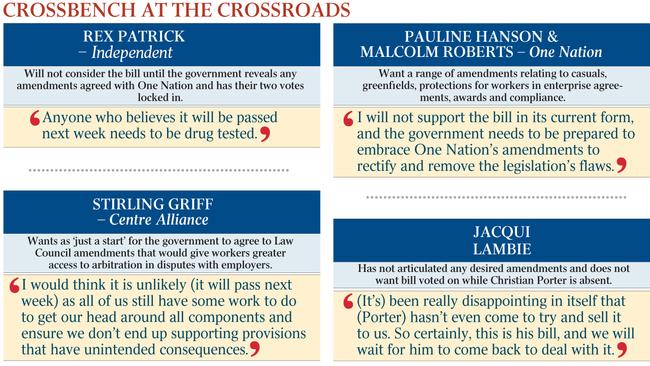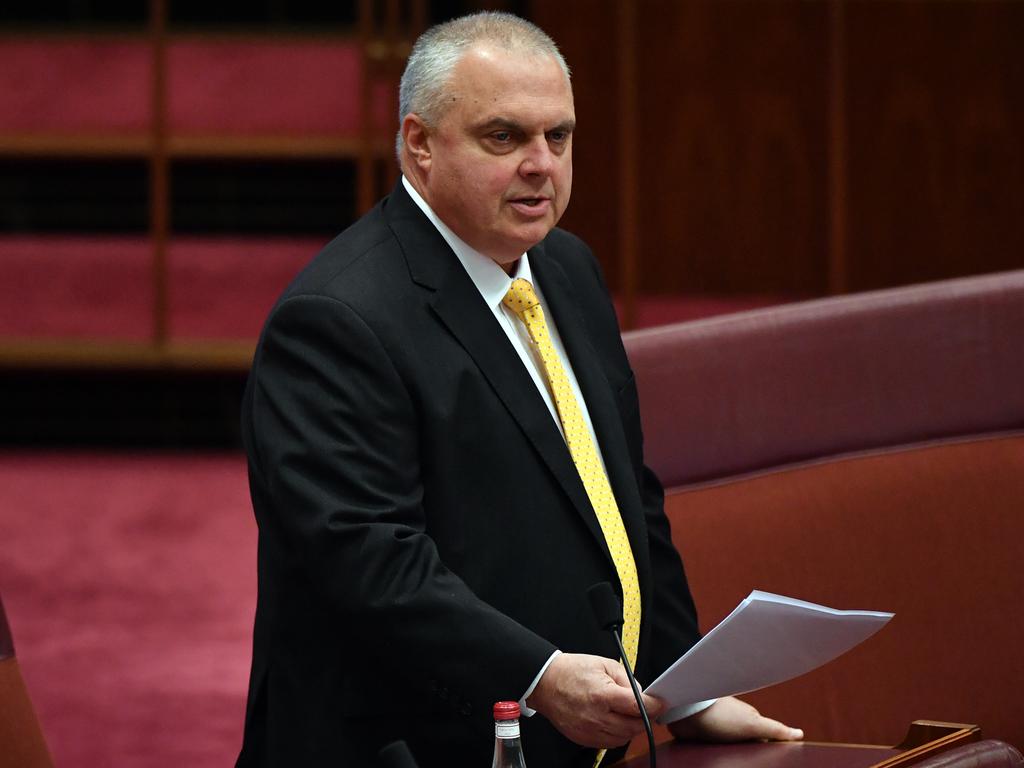Senate throws spanner in the works of workplace reform
Morrison government will need to make significant concessions to get its industrial relations changes passed next week.

The Morrison government will need to make significant concessions to get its industrial relations changes passed next week, risking a business backlash if it submits to Senate crossbench demands to give workers greater rights when in dispute with employers.
With the Coalition wanting the bill legislated next week to avoid a political fight over industrial relations in the budget sittings, the government will have to agree to a raft of amendments proposed by One Nation and crossbencher Stirling Griff to have any chance of getting the three out of five crossbench votes it needs.
One Nation’s Malcolm Roberts, who with Pauline Hanson holds two crossbench votes, said on Thursday night the minor party would seek more than 12 amendments across five areas to address “flaws” in the bill.
Senator Roberts said One Nation wanted to “diminish ’interference from unwarranted third parties” — a position that appears at odds with Senator Griff, who wants increased powers for the Fair Work Commission to arbitrate disputes over casual conversion requests, wage underpayment claims up to $50,000, and employment condition disputes relating to new eight-year greenfield agreements.

Tasmanian senator Jacqui Lambie on Thursday ruled out negotiating over the bill while Industrial Relations Minister and Attorney-General Christian Porter was away on leave.
And South Australian senator Rex Patrick said he did not believe the bill would be passed next week. “Anyone who believes it will be passed next week needs to be drug tested,” he told The Australian.
“It is within the realms of possibility that it could get passed in May or June but there would have to be substantial changes.”
Senator Griff said he wanted the government — as “just a start” — to agree to amendments recommended by the Law Council that would give workers greater access to arbitration in disputes with their employers.
“I would think it is unlikely (it will pass next week) as all of us still have some work to do to get our head around all components and ensure we don’t end up supporting provisions that have unintended consequences,” he told The Australian, adding: “We may well get part of the way next week.”
Business groups are vehemently opposed to the FWC being given greater arbitration powers. Australian Mines and Metal Association chief executive Steve Knott called the union-backed “forced arbitration proposal a job killer for the COVID recovery”.
“AMMA urges members of the Senate crossbench to see forced arbitration proposals for what they are — a campaign to kill off the government’s IR reform bill, knowing full well that new forced arbitration processes could not possibly be supported by Australia’s business community,” he said.
ACTU secretary Sally McManus said Mr Knott’s comments showed employer lobby groups did not want workers to be able to enforce their rights. “And because the Liberal Party does what they (the employer groups) say, the omnibus bill is a fail,” she said.
Senator Roberts said One Nation’s amendments were across the bill’s five areas — casuals, modern awards, enterprise agreements, greenfield agreements, and compliance — and would be shared with acting Industrial Relations Minister Michaelia Cash and crossbenchers on Monday.
He said One Nation would continue “working constructively with the government and crossbench members to ensure we get the best outcome”.
“(Our) yardstick for quality industrial relations has been: does it provide certainty, protection and fairness for employers and employees? Does it enable business, especially small and family businesses, to retain and create jobs? And does the legislation make the IR rules clearer, simpler, cheaper and quicker for everyone?”
Senator Patrick said the government would need to lock in two crossbench votes before he would enter into negotiations over the bill. He said there was no point having talks about the bill if it was then going to be substantially changed by any amendments agreed with One Nation.
A Senate inquiry will hand down its report into the bill on Friday, and crossbenchers have questioned whether they will have time to digest its findings before the government pursues negotiations and a vote next week.
Senator Lambie said Mr Porter and his staff had not contacted her over the past few months about the bill. “That’s been really disappointing in itself that he hasn’t even come to try and sell it to us,” she told Sky News. “So certainly, this is his bill, and we will wait for him to come back to deal with it.”








To join the conversation, please log in. Don't have an account? Register
Join the conversation, you are commenting as Logout